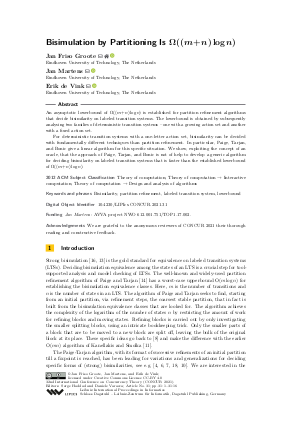Bisimulation by Partitioning Is Ω((m+n)log n)
Authors
Jan Friso Groote  ,
Jan Martens
,
Jan Martens  ,
Erik de Vink
,
Erik de Vink 
-
Part of:
Volume:
32nd International Conference on Concurrency Theory (CONCUR 2021)
Part of: Series: Leibniz International Proceedings in Informatics (LIPIcs)
Part of: Conference: International Conference on Concurrency Theory (CONCUR) - License:
 Creative Commons Attribution 4.0 International license
Creative Commons Attribution 4.0 International license
- Publication Date: 2021-08-13
File

PDF
LIPIcs.CONCUR.2021.31.pdf
- Filesize: 0.77 MB
- 16 pages
Document Identifiers
Subject Classification
ACM Subject Classification
- Theory of computation
- Theory of computation → Interactive computation
- Theory of computation → Design and analysis of algorithms
Keywords
- Bisimilarity
- partition refinement
- labeled transition system
- lowerbound
Metrics
- Access Statistics
-
Total Accesses (updated on a weekly basis)
0Document
0Metadata
Abstract
An asymptotic lowerbound of Ω((m+n)log n) is established for partition refinement algorithms that decide bisimilarity on labeled transition systems. The lowerbound is obtained by subsequently analysing two families of deterministic transition systems - one with a growing action set and another with a fixed action set. For deterministic transition systems with a one-letter action set, bisimilarity can be decided with fundamentally different techniques than partition refinement. In particular, Paige, Tarjan, and Bonic give a linear algorithm for this specific situation. We show, exploiting the concept of an oracle, that the approach of Paige, Tarjan, and Bonic is not of help to develop a generic algorithm for deciding bisimilarity on labeled transition systems that is faster than the established lowerbound of Ω((m+n)log n).
Cite As Get BibTex
Jan Friso Groote, Jan Martens, and Erik de Vink. Bisimulation by Partitioning Is Ω((m+n)log n). In 32nd International Conference on Concurrency Theory (CONCUR 2021). Leibniz International Proceedings in Informatics (LIPIcs), Volume 203, pp. 31:1-31:16, Schloss Dagstuhl – Leibniz-Zentrum für Informatik (2021)
https://doi.org/10.4230/LIPIcs.CONCUR.2021.31
BibTex
@InProceedings{groote_et_al:LIPIcs.CONCUR.2021.31,
author = {Groote, Jan Friso and Martens, Jan and de Vink, Erik},
title = {{Bisimulation by Partitioning Is \Omega((m+n)log n)}},
booktitle = {32nd International Conference on Concurrency Theory (CONCUR 2021)},
pages = {31:1--31:16},
series = {Leibniz International Proceedings in Informatics (LIPIcs)},
ISBN = {978-3-95977-203-7},
ISSN = {1868-8969},
year = {2021},
volume = {203},
editor = {Haddad, Serge and Varacca, Daniele},
publisher = {Schloss Dagstuhl -- Leibniz-Zentrum f{\"u}r Informatik},
address = {Dagstuhl, Germany},
URL = {https://drops.dagstuhl.de/entities/document/10.4230/LIPIcs.CONCUR.2021.31},
URN = {urn:nbn:de:0030-drops-144087},
doi = {10.4230/LIPIcs.CONCUR.2021.31},
annote = {Keywords: Bisimilarity, partition refinement, labeled transition system, lowerbound}
}
Author Details
Funding
- Martens, Jan: AVVA project NWO 612.001.751/TOP1.17.002.
Acknowledgements
We are grateful to the anonymous reviewers of CONCUR 2021 their thorough reading and constructive feedback.
References
-
J. Balcázar, J. Gabarro, and M. Santha. Deciding bisimilarity is P-complete. Formal Aspects of Computing, 4(1):638-648, 1992.

-
C. Berkholz, P. Bonsma, and M. Grohe. Tight lower and upper bounds for the complexity of canonical colour refinement. Theory of Computing Systems, 60(4):581-614, 2017.

-
J. Berstel and O. Carton. On the complexity of Hopcroft’s state minimization algorithm. In M. Domaratzki et al., editor, Proc. CIAA 2004, pages 35-44. LNCS 3317, 2004.

- P. Buchholz. Exact performance equivalence: An equivalence relation for stochastic automata. Theoretical Computer Science, 215:263-287, 1999. URL: https://doi.org/10.1016/S0304-3975(98)00169-8.
-
G. Castiglione, A. Restivo, and M. Sciortino. Hopcroft’s algorithm and cyclic automata. In C. Martín-Vide et al., editor, Proc. LATA 2008, pages 172-183. LNCS 5196, 2008.

- A. Dovier, C. Piazza, and A. Policriti. An efficient algorithm for computing bisimulation equivalence. Theoretical Computer Sciemce, 311:221-256, 2004. URL: https://doi.org/10.1016/S0304-3975(03)00361-X.
-
J.F. Groote, H.J. Rivera Verduzco, and E.P. de Vink. An efficient algorithm to determine probabilistic bisimulation. Algorithms, 11(9):131,1-22, 2018.

-
J. Hopcroft. An n log n algorithm for minimizing states in a finite automaton. In Z. Kohavi and A. Paz, editors, Theory of Machines and Computations, pages 189-196. Academic Press, 1971.

-
J. Jájá and Kwan Woo Ryu. An efficient parallel algorithm for the single function coarsest partition problem. Theoretical Computer Science, 129(2):293-307, 1994.

- D.N. Jansen, J.F. Groote, J.J.A. Keiren, and A. Wijs. An O(m log n) algorithm for branching bisimilarity on labelled transition systems. In A. Biere and D. Parker, editors, Proc. TACAS, pages 3-20. LNCS 12079, 2020. URL: https://doi.org/10.1007/978-3-030-45237-7_1.
- P.C. Kanellakis and S.A. Smolka. CCS expressions, finite state processes, and three problems of equivalence. Information and Computation, 86(1):43-68, 1990. URL: https://doi.org/10.1016/0890-5401(90)90025-D.
-
J. Martens, J.F. Groote, L. van de Haak, P. Hijma, and A. Wijs. A linear parallel algorithm to compute bisimulation and relational coarsest partitions. In preparation.

- R. Milner. A Calculus of Communicating Systems. LNCS 92, 1980. URL: https://doi.org/10.1007/3-540-10235-3.
-
R. Paige and R.E. Tarjan. Three partition refinement algorithms. SIAM Journal on Computing, 16(6):973-989, 1987.

-
R. Paige, R.E. Tarjan, and R. Bonic. A linear time solution to the single function coarsest partition problem. Theoretical Computer Science, 40:67-84, 1985.

- D.M.R. Park. Concurrency and automata on infinite sequences. In P. Deussen, editor, Proc. 5th GI-Conference on Theoretical Computer Science, pages 167-183. LNCS 104, 1981. URL: https://doi.org/10.1007/BFb0017309.
-
S. Rajasekaran and I. Lee. Parallel algorithms for relational coarsest partition problems. IEEE Transactions on Parallel and Distrubuted Systems, 9(7):687-699, 1998.

- T. Wißmann, U. Dorsch, S. Milius, and L. Schröder. Efficient and modular coalgebraic partition refinement. Logical Methods Computer Science, 16(1), 2020. URL: https://doi.org/10.23638/LMCS-16(1:8)2020.
